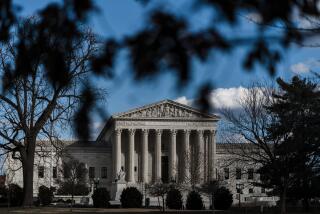High Court Weighs Legality of Huge Punitive Verdicts
- Share via
WASHINGTON — The Supreme Court, confronting the constitutionality of massive punitive damage awards, debated Wednesday whether an insurance company based in Newport Beach should be required to pay a $1-million penalty for a fraud committed by one of its agents in Alabama.
Lawyers for Pacific Mutual Life Insurance Co. said the Constitution and its guarantee of fairness does not permit the imposition of a seven-figure verdict over a $3,000 insurance claim, particularly when the company had no idea that the agent was pocketing insurance premiums.
The company “should not be punished when it, in fact, was a victim of embezzlement,” Los Angeles attorney Bruce Beckman, representing Pacific Mutual, said in oral arguments before the high court.
The Supreme Court has been pressed in recent years by an array of private interests--including manufacturers, insurance companies, accounting firms, hospitals, news organizations and churches--to impose restraints on punitive damages awarded by juries across the country.
Advocates of such limits contend that punitive damage verdicts have spiraled out of control, causing significant financial harm to American businesses and unfairly punishing those firms with deep enough pockets to pay big judgments.
In the past, several Supreme Court justices have expressed concern about skyrocketing damage awards and they sounded sympathetic to Pacific Mutual’s plight as the two sides in the case presented their arguments.
But the Pacific Mutual case presents a classic dilemma for the conservative justices: Should they limit damage verdicts that harm American business or should they adopt their usual posture of letting state legislatures and state judges resolve the problem?
Indeed, Washington attorney Bruce Ennis, representing the plaintiff in this case, highlighted that point in his closing argument.
“This is a case that calls for judicial restraint, not judicial activism,” he said. “There does not have to be a constitutional remedy for every social wrong,” Ennis said, reciting a favorite theme of the court’s conservatives.
The case is essentially one of fraud committed by an insurance agent. Lemmie Ruffin, a part-time sales agent of Pacific Mutual, sold a combined life and health insurance policy to city employees of Roosevelt, Ala. But rather than forwarding the premiums to the company, Ruffin pocketed the money, allowing the policies to lapse.
When Cleopatra Haslip, a city employee, was hospitalized in 1982, she discovered that she had no insurance. She sued, seeking $3,000 to pay her bills and $200,000 for emotional distress. Instead, an Alabama jury awarded her $1.04 million. Since Ruffin had disappeared, Pacific Mutual was held responsible for paying the verdict.
Attorney Ennis said the Alabama courts upheld the verdict because the jury was entitled to punish the company for “intentional wrongdoing.”
“That’s a strange interpretation of ‘intentional wrongdoing,’ ” said Justice Antonin Scalia, referring to the fact that Pacific Mutual officials in Orange County were not aware of the Alabama agent’s actions.
Scalia and Justice Anthony M. Kennedy raised the issue of whether huge punitive verdicts are “so arbitrary and unpredictable” as to violate the Constitution’s guarantee of due process of law.
But the justices seemed uncertain what course to take. Corporate lawyers have offered several suggestions, including establishing a dollar cap on damage verdicts, limiting punitive awards to two or three times actual damages or, perhaps, instructing juries that punitive damages should be added only in the most outrageous cases.
Lawyers who represent plaintiffs, joined by Consumers Union, offered another suggestion: Do nothing. They contend that large punitive verdicts are needed to deter wrongdoing by corporate giants. Moreover, they add, many states are now setting limits in law, and the Supreme Court should not interfere.
The “do-nothing” option seemed to attract several justices, in part because punitive awards have been a tradition in American courts for 200 years. “Who’s to whisper in my ear and say that even though this has been going on since 1791, now it’s wrong?” Scalia asked.
The eight justices will meet behind closed doors Friday to vote on the case (Pacific Mutual vs. Haslip, 89-1279).
More to Read
Sign up for Essential California
The most important California stories and recommendations in your inbox every morning.
You may occasionally receive promotional content from the Los Angeles Times.











